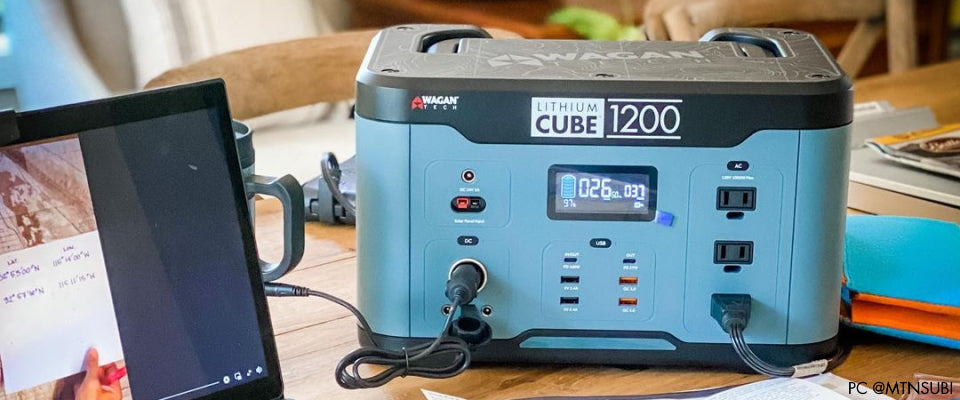by Justin Gray
This is a question that we often get, "should I go with a dual-battery setup or get a portable power supply (Lithium Cube)?". The answer to that is dependent on your needs...so let's explore!
First, we'll explain the differences in setup and then we can take a look at the pros and cons of both.

Dual-battery system
A dual-battery setup is great for vehicle-bound exploration as it uses the vehicle's alternator to charge the batteries as you drive. These systems are maintenance free and full-automatic in design.
To be efficient, a dual battery setup will need a DC to DC Battery charger. You can get away with using an isolator or directly connecting the two batteries together, but there are major issues with that (I will explain shortly).
In the very least, you'll need: a battery, battery tray, fuses, and wiring.
You can wire the two batteries together in parallel, but the second battery will never fully charge nor with there be any protection from draining both batteries dead - leaving you stranded and likely having to replace the batteries (fully draining and lead-acid based battery will damage them).
If you go with an isolator, you still won't be able to charge the second battery fully, but at least you'll have a way to stop from draining your starter battery. Not fully charging the second battery gives you less power to use and ultimately shortens the battery's useable life.

Honestly, it is best to do it right the first time and get a DC to DC Battery charger knowing that it will intelligently fully-charge your battery, protect the system, and allow solar future integration.

Portable Power Stations
A portable power supply (PPS) is an all-in-one device that has a battery, inverter (AC), USB outlets, and 12V (DC) outputs in a compact (portable) package. They're also known as: Portable Power Supply, and even incorrectly called UPS (Uninterruptible Power Supply) units or Battery Generators.

The biggest benefits to this option is: compact size, the ability to carry it where you need it, no wiring it into your vehicle's electronics, and it is extremely user-friendly. The down-side is that they'll have to be manually recharged, they take up precious cargo space, are often more expensive than a dual-battery system, and offer smaller battery capacity than a standard dual-battery setup.
On the BIG plus-side, the PPS can be recharged via any power source including: wall-outlet (AC), car power (DC), solar, wind/water turbine, and even USB (yes, you read that right... our unit can be recharged via USB!).

Which is right for you?
Some answers are quite obvious. If you need power away from the vehicle, or want something that you don't have to wire into the vehicle, a PPS is the ideal solution as it comes ready-to-use.
If you are working out of or around the vehicle and want a system that needs virtually no maintenance, a dual-battery setup is perfect for that. Do you need 120V AC (wall outlet) power in your dual-battery setup? If so, you'll need to add a power inverter into your system; this will add to the overall cost.
Both systems have their advantages and disadvantages; one is maintenance free, but tied to the vehicle - while the other is free to roam but must be recharged manually.
Questions/Comments?
Did I leave you with more questions than answers? Need more help identifying which is best for you? Contact our Customer Service Team!
Do you have an opinion on this blog or have helpful insight? Leave a comment below!
Links:





Comments (1)
If you have four 12v-100a batteries connected in series for 48v can you add a fifth battery in parallel to get 200a?